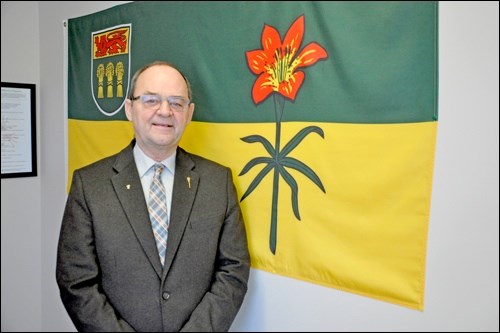In an interview with the News-Optimist this week, Battlefords MLA Herb Cox looked back on what he feels was a productive fall session of the legislature.
“From my view we had a very busy session,” said Cox. “We introduced I think 34 bills this fall session.”
One included the new trespass act, which Cox said is “just reversing the onus – people now have to get permission to cross private property rather than having the owners post the property.”
He also pointed to the change in the Election Act to move the provincial election date in 2020 up to Oct. 26 and the municipal elections to Nov. 9, so that there will be two weeks between elections.
“Hopefully that will cut down the overlap a little bit,” said Cox.
From a local standpoint, Cox was very happy to see completion of the twinning of the lanes on Highway 4.
“That wasn’t part of the legislature but that was part of the work going on,” said Cox.
The MLA also welcomed the move towards allowing rural municipalities to join up as part of regional police forces.
That move stemmed from the Crime Reduction consultations that he had chaired, Cox said.
“One of the things that we learned was that local governments could not go together to form a regional police force,” said Cox. The legislation is being changed to allow that to happen. “Certainly we’re always aware of what we can do to curb crime a little bit.”
Another initiative happening in the Battlefords is the combined Police and Crisis Team initiative, pairing the RCMP with health professionals to address mental health and addictions issues.
Cox said people will “get help in a more timely manner,” and it will “relieve the amount of pressure in emergency rooms and frees up the RCMP.”
Cox is very pleased to see the new Saskatchewan Hospital and integrated correctional facility almost up and running. Based on discussions he’s had in the past couple of weeks the process of transitioning patients from the old facility to the new one is well underway.
“They’re excited, the patients are starting to move in and get settled in and they’re just loving their surroundings,” said Cox, who says the approach being taken during the move is for “as little disruption to their normal routine as possible.”
Cox adds he expects an announcement on a grand opening to happen in the new year.
Other initiatives planned for the new year include the formal apology by the province for the Sixties Scoop.
Leading up to that apology has been an ongoing process, with several “listening circles” and “healing circles” organized in the province. Cox said he took part in the one in North Battleford, hearing the stories of those who had gone through the Sixties Scoop.
A hot issue for the government right now is ongoing concerns about head office jobs with Nutrien, with top executives opting for Calgary even though the company is mandated by legislation to have its head office in Saskatoon. Cox acknowledged the recent meetings between the company and Premier Scott Moe on the issue.
“That was something we want to see happen, that Nutrien keeps its head office here,” said Cox.
Finally, the government continues to focus on the ongoing concerns about pipelines and the carbon tax. Cox notes the court case on the carbon tax issue is due to be heard in February.
As for pipelines, Cox said the situation right now “defies logic,” as he pointed to the deep discounts on Saskatchewan oil compared to West Texas Crude.
“There’s just no reason for that. We’ve got to continue working to get our crude to tidewater,” said Cox.



